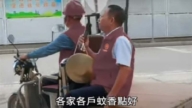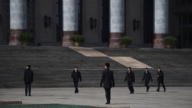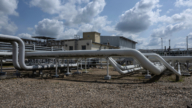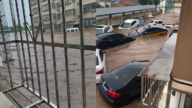【新唐人2014年05月12日讯】今年中国第一季度,有超过41%的基金集体清空所属地产股份。同时,房地产开发商的净负债权益比,达到2007年以来的最高水平。专家指出,地产泡沫的破灭,对整个社会来讲却是一件“好事”。我们一起来看看。
中共官媒《新华社》5月8号报导,今年一季度,房地产仅次于金融业,成为基金的第二大净减持行业。在统计的625支股票型和混合型基金中,有258支清空地产股,清仓比例高达41.28%。
地产股已经成为各大基金的“烫手山芋”。《东方财富网》数据显示,最近一个月以来,地产板块,除了4月24号有3亿元左右的小幅净流入外,其他交易日一直处于净流出状态。5.1假期后的第一个交易日,地产板块主力净流出额,接近7亿元。
另外,还出现了退还土地现象。日前,北京房企“中筑置业”,要求退回一个月前在热卖中买下的一块地产,这地块处于北京丰台长辛店,出让时竞买保证金为4亿2300万元。《第一财经日报》评论说,成交清淡的首都,楼市成了惊弓之鸟,房地产企业的退地举动有一定趋势性意义。
从今年一季度净利润来看,51家上市房地产企业中,有12家出现亏损,超过一半的房地产企业,净利润同比出现下滑。据大陆Wind资讯统计,今年一季度,公募基金全部清空了这些上市房地产企业的股票。
北京师范大学MBA导师段绍译:“这是一种理性的选择,是一种市场的信号,中国的地产泡沫要破灭了。地产泡沫一破灭的话,对地方的财政收入还是有很大影响的,但是我认为这是个好事,如果还不破的话,会使政府更加依赖土地,并且造成资源的浪费,政府更加腐败。”
大陆财经评论家牛刀:“中国房地产泡沫不仅要破灭,而且房价要打回原形,就是当年2008年的价格,回到那个价格。”
5月5号,大陆证券商“高盛高华”发布的公告说,110家A股房地产财务状况恶化,这些开发商净负债权益比,上升到2007年以来的最高水平,它们现金余额与短期债务之比,也返回到2008年下半年,和2011年四季度水平。
另外,开发商的经营性净现金流也显着恶化。一季度仅有28%的开发商经营性净现金流为正,对比发现,这与2008年一季度的情况相当,当时 27%的开发商公布的正经营性净现金流,为历史最低水平。
同时,“兴业证券”的报告也显示,上市房地产企业,一季度末有息负债率为33.2%,接近历史高位;而行业净负债率由上季度末的78%,大幅上升到93%,达到历史峰值。从货币现金比例上来看,1季度末货币现金比例为10.9%,也接近历史低位。
同时,1季度负债率的大幅上升,也叠加了销售回款的减弱和建安、土地款的支出,一些房地产企业出现了季度性的亏损,有的业绩下滑幅度高达1259%,亏损额在1000万元至1400万元之间。
牛刀:“在房地产发生问题的时候,央行,就是包括政府,动员一切手段来维护这个房价,他不按市场来走,不按市场来走总有一天它要受到很大的惩罚,因为最后的结果,你拿任何货币都维护不了泡沫的时候,现在就是这样子,已经到了云端,已经再印钞票没有用了。”
北京市住房和城乡建设委员会网站显示,4月份,北京市二手住宅成交量达到近期以来最低水平,只有7616套;而5.1假期北京二手房成交只有31套,同比下滑超过八成,创下近6年来新低。同时,多家房地产超过8成的房源挂牌价,都进行了下调。
采访编辑/刘惠 后制/李勇
41% Mutual Funds Eradicated the “Hot Potato” Real Estat
During the 1st quarter, about 41% hybrid mutual funds eradicated
the real estate sector. Meanwhile, the developers’ net debt to equity ratio
has reached a record high since 2007.
Professionals stated that the bubble of China’s real estate industry
is about to burst, which is a good thing for the whole society.
On May 8, the state-run media “Xinhua News Agency” reported that
real estate had become the second least profitable industry sector,
right after the financial sector, during the first quarter.
Among 625 hybrid mutual funds, 258, or 41.28%, have already
eradicated the real estate sector from the funds.
Real estate has become “a hot potato” for all big mutual funds.
The data from “eastmoney.com” show that the real estate sector
only had about 0.3 billion Chinese Yuan cash inflow on April 24 lastmonth.
All other trading days, there were only cash outflows.
During the first trading day after May 1st holiday,
the cash outflows in the real estate sector amounted to
0.7 billion Chinese Yuan.
In addition, some purchased lands have been returned.
Recently, the property enterprise “Zhong Zhu Zhi Ye”
asked to return a piece of land it purchased a month ago.
This piece of land is located in Xindian, Fengtai, Beijing.
The bidding deposit for this land was 0.423 billion Chinese Yuan.
As commented in “First Financial Daily”,
light trading market in real estate indicates the property market
has been in panic in Beijing.
The action of land returning predicts the tendency.
From the perspective of net profit, 12 out of 51 real estate stock companies
experienced a financial loss during the 1st quarter.
More than half of them suffered from a profit decrease.
Based on the statistics from “Wind Statistics”,
all public offering funds eradicated the stocks of
these real estate companies in the 1st quarter.
Duan Shaoyi, MBA mentor from Beijing Normal University,
“The choice of the mutual funds is rational.
It’s actually releasing a market signal.
The bubble of China’s real estate industry is about to burst.
Once it bursts, it’ll impact the financial income of local government tremendously.
I think it’s a good thing. If it doesn’t burst, local governments will collect
more money from lands. It’s totally a waste of resources.
It’ll only make the government more corrupt. ”
Niu Dao, financial commentator in China,
“Not only is the bubble of China’s real estate going to burst,
but housing prices will drop to the normal level as in 2008.”
On May 5, the securities firm “Goldman Sachs Gao Hua”
announced that the financial situation of 110 A-shares real estate companies
had deteriorated. The net debt to equity ratio of these developers
has reached a record high since 2007.
The cash balance to short-term debt ratio has also dropped
to the level of that in 4th quarter, 2011, or in second half year in 2008.
In addition, the next operational cash flows of those developers
have also dramatically deteriorated.
During the 1st quarter, 2014, only 28% of them have positive operational cash flows,
equivalent to the level in 2008.
At the time of 2008, 27% of the developers published positive net operational cash flows,
which were at a record low level historically.
Meanwhile, the report from “Societe Generale Securities”
shows that the percentage of debt with interest is 33.2%
among the real estate stock companies, which is a record high as well.
Whereas, the net debt rate has risen to 93% from 78% since last quarter,
which is the historical peak.
However, available cash only accounts for 10.9%,
close to the historical lowest level.
With the spiking debt ratio, a poor collection of sales payment,
and expenses on construction and land purchase,
some real estate companies have experienced financial losses.
For some of them, profit has dropped as much as 1259%,
from 10,000 to 14,000 thousand Chinese Yuan.
Niu Dao: “When the real estate industry gets into trouble,
the central bank and the government would try all means to maintain
housing prices instead of following the market.
Nonetheless, if you don’t follow the market,
you will be punished by the market sooner or later.
In the end, you can’t prevent the bubble from bursting with money anymore.
It is the case right now.
It’s cloud-high now and printing more money cannot help anymore.”
On the website of “Beijing Housing and City Construction Committee”,
it shows that the second-hand house trading volume was 7,616 in April.
During May 1st holiday, only 31 deals were completed,
which dropped more than 80% and reached a record low since the past 6 years.
Meanwhile, the price of 80% of the houses has been lowered.
Interview & Edit/Liuhui Post-Production/Liyong






























